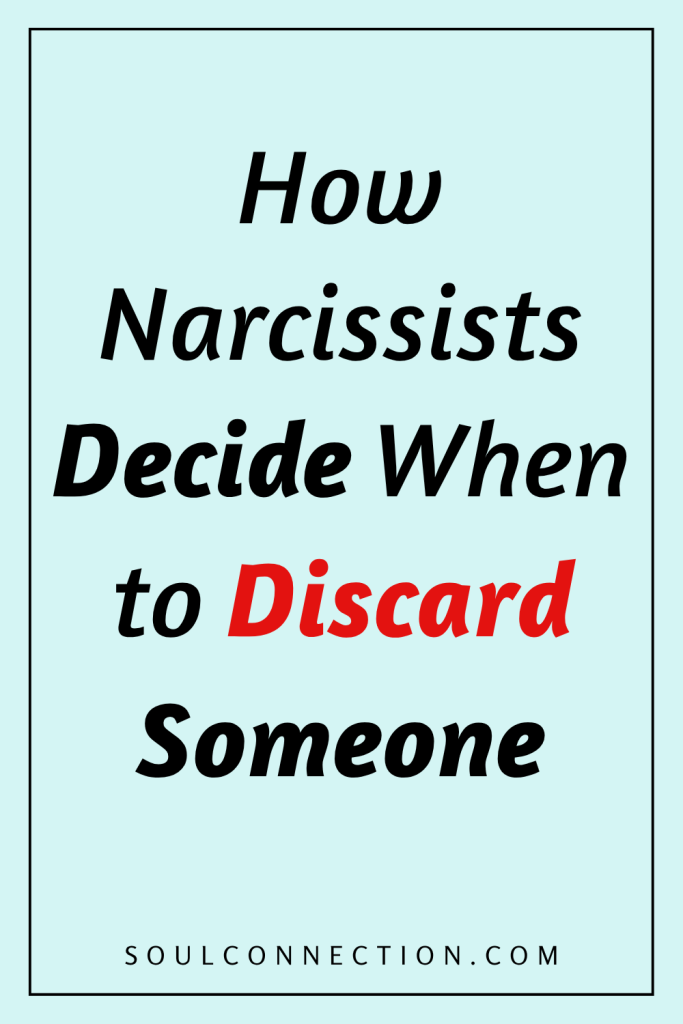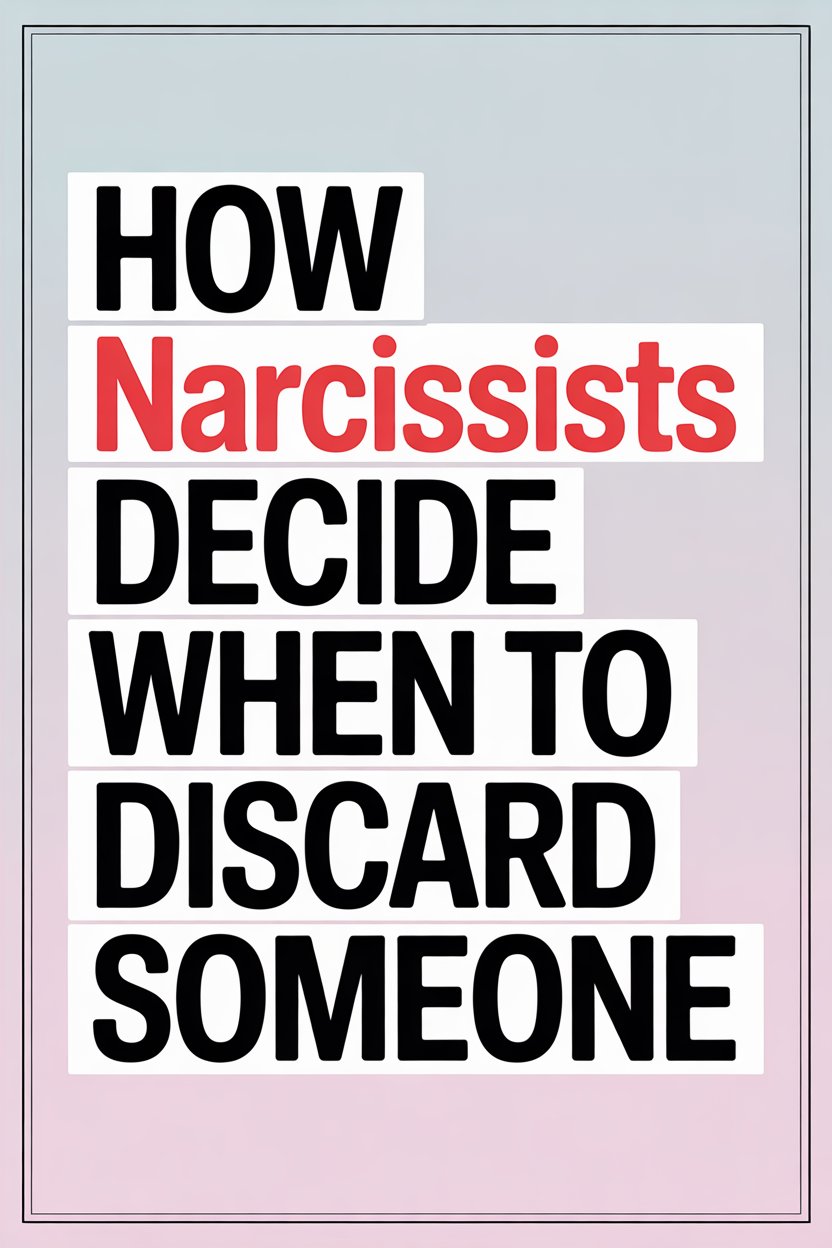When it comes to relationships with narcissists, there’s one thing you can count on: unpredictability. Narcissists have a signature move that’s every bit as dramatic as a soap opera wedding—it’s called the discard.
One minute, you’re being showered with love bombs and grand gestures. The next, you’re out the door, left wondering how you went from soulmate to “who’s that?” faster than you can say, “Was it something I said?”
Let’s pull back the curtain on how narcissists decide it’s time for someone to exit stage left.
The Narcissist’s Playbook The Idealize-Devalue-Discard Cycle
Every narcissistic relationship runs on a script, and it’s rarely original. It starts with idolization: the narcissist places you on a pedestal so high you’re at risk of altitude sickness.
Then, as predictably as the British weather turning, things shift. The devaluation phase kicks in, and the compliments disappear faster than a tray of sausage rolls at a family gathering.
The finale? The discard—when the narcissist decides you’re no longer useful, interesting, or adoring enough. This isn’t impulsive. It’s calculated, and often coldly so.
The Utility Meter Is Running
Narcissists view people less like companions and more like vending machines: insert validation, receive emotional snacks.
When your “utility” dips—meaning you’re not providing enough ego boosts, admiration, or perks—the narcissist’s gaze starts wandering.
This isn’t always about dramatic betrayals or fights. Sometimes, it’s as simple as your supply running dry.
You didn’t laugh at their joke? You questioned their story? You made the daring move of being tired after a long day and not applauding their every move? The meter ticks down.
Once the utility meter hits zero, the narcissist starts shopping around for a new supplier.
Subtle signs appear: texts go unanswered, compliments get replaced with criticism, and you may find a mysterious “friend” being mentioned a little too often.
The Threat to Their Grand Illusion
Narcissists are all about image—think of them as Instagram influencers, but with fewer filters and more denial. The moment you become a threat to their carefully curated self-concept, you’re on thin ice.
Did you spot an inconsistency in their story? Challenge their version of events? Or, heaven forbid, point out a flaw? That’s a direct hit to their ego, and narcissists protect their egos like a dragon guards gold.
No one messes with the brand.
When challenged, they may try to gaslight you (“That never happened, you’re imagining things”) or flip the blame (“Why do you always criticize?”). But if you keep threatening their self-image, discard is just around the corner.
The Lure of Fresh Narcissistic Supply
Narcissists have all the loyalty of a cat presented with a better brand of kibble. If someone new appears who seems easier to impress, more eager to please, or simply better suited to playing the role of #1 Fan, the narcissist’s attention shifts.
This doesn’t always happen because the new person is special—it’s often because they’re simply new. The novelty means fewer demands, more admiration, and none of that pesky “calling them out” business.
It’s the honeymoon phase all over again, with a shiny new cast member.
The moment a more appealing source of attention is on the horizon, the current partner’s days are numbered.
Emotional Fallout Isn’t a Concern
Empathy isn’t high on a narcissist’s list of hobbies. The emotional impact of the discard—on you, your feelings, your life plans—is rarely considered for more than a nanosecond.
Instead, the focus is entirely on their own comfort and needs. If discarding you is inconvenient, they might drag things out or even oscillate between hot and cold, keeping you on the hook just in case their new source doesn’t pan out.
But once the decision is made, the emotional consequences for you are treated as little more than background noise.
Testing Boundaries and Tolerance
Narcissists love a good experiment, particularly one involving your boundaries. They may start with minor infractions: ignoring your requests, showing up late, dismissing your feelings. Each time you let it slide, the ante goes up.
This isn’t random cruelty—it’s reconnaissance. If you start standing up for yourself, enforcing limits, or even (gasp) expecting reciprocity, the narcissist evaluates whether it’s worth the effort to get you back in line.
If you refuse to bend, they’re likely to decide you’re too much work. And just like that, “next!”
The Ego Bruise That Won’t Heal
Sometimes the discard happens abruptly after a major ego injury. Maybe you outshine them at a party. Perhaps you get a promotion. Or your friends start to see through their act and stop singing their praises.
For a narcissist, these moments are intolerable. They’re a walking billboard for “I’m not as special as I think I am.”
When an ego bruise festers, the discard is the narcissist’s way of regaining control. Out you go, and with you goes the evidence of their imperfections.
The Fear of Exposure
Narcissists thrive on controlling information. If you know too much about their secrets, lies, or manipulations—and there’s a risk you might expose them—the discard often comes swiftly and decisively.
Self-preservation kicks in. They may try to flip the script, painting themselves as a victim or accusing you of the very things they’ve done. Anything to distract from the truth.
When you become a liability, they move fast. If you’ve ever wondered, “Did I just get ghosted for being perceptive?”—the answer may well be yes.
The Escalating Chaos
Some discards aren’t cool, calculated decisions. When the relationship spirals into constant arguments, drama, or scenes worthy of a reality TV show, the narcissist may decide the chaos isn’t worth the hassle.
Alternatively, they might provoke chaos intentionally just to justify the discard. If they can get you to react, it gives them an excuse to call you “unstable” or “too much drama.”
Either way, the result is the same: the relationship ends with a bang, not a whimper.
The Sudden Shift in Narrative
One day you’re the best thing since sliced bread, the next you’re “toxic,” “clingy,” or “impossible to please.” It’s not you, it’s the narcissist rewriting history to justify their exit.
Rewriting the narrative is a favorite trick. It allows them to leave without guilt, because as far as they’re concerned, you deserved it.
You changed, you failed them, you became “crazy.” Never mind the months (or years) of projection and provocation—it’s all your fault now.
What You Can Do Tonight if You Suspect a Narcissistic Discard
Knowledge is power, but it won’t stop a narcissist from being a narcissist. What you can do is start shifting the spotlight back to yourself.
- Check in with your own boundaries. Where are you compromising your needs or values?
- Start documenting interactions. If the gaslighting or blame-shifting ramps up, having a record helps you keep your grip on reality.
- Reach out to your support network. Isolation is a narcissist’s best friend. Don’t give them the satisfaction.
- Make plans for your own wellbeing. Start thinking about what you need—emotionally, practically, even logistically—if the discard comes.
Self-preservation isn’t selfish. It’s the bare minimum when you’re dealing with someone who sees you as replaceable the moment you stop reflecting their ideal self.
Recovering Your Sanity After the Discard
If you’ve already been discarded and you’re reading this, sorry for the club you never wanted to join. While the narcissist has moved on with all the apparent emotional depth of a goldfish, you’re left with all the feelings.
Give yourself permission to grieve, rage, and heal. You weren’t “not enough”—you were simply too real for someone hooked on fantasy.
Find comfort in reclaiming your reality. The narcissist’s opinion is not a verdict on your worth. Not now, not ever.
The Silver Lining After the Storm
No one volunteers to be the star of a narcissist’s discard drama. But there’s a silver lining, even if it feels paper-thin at first: you get to write your own story now.
Bit by bit, the confusion fades, the self-doubt lifts, and you begin to trust yourself again.
The best part? Next time, you’ll spot the narcissist from a mile away—and your utility meter will be switched firmly to “out of service.”


